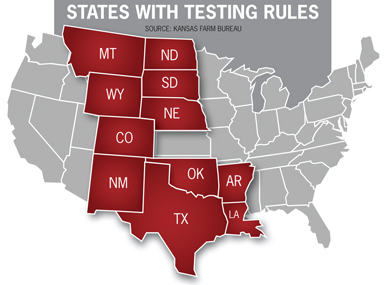Trich Makes A Comeback


| Bonus Content Find import/export testing rules at the following links:
|
|---|
Trichomoniasis (trich), often a concern for Western cattle producers, is now affecting areas not accustomed to it, says Missouri veterinarian Dan Goehl. "When introduced into a herd, it can be one of the most devastating reproductive diseases we face."
Trich causes embryonic death, abortions and infertility. Producers who closely observe their cowherd may notice cattle cycling late into the breeding season, Goehl says. But many producers may not realize there is a problem.
"Most cows will clear themselves of the infection within three months, but they may lose their fetus during that time," says Charlie Stoltenow, North Dakota State
University Extension Service veterinarian. "After infection, cows have a two- to six-month immunity and then can become reinfected. Bulls more than four years old become infected permanently."
These infected bulls will infect cows as they breed them. Cows bred by an infected bull become pregnant but will abort 60 to 120 days later. Once the pregnancy is lost, the cow will often clear the infection and become pregnant again, this time carrying the pregnancy to term, Goehl explains. "As a result, 30% to 40% of the cows will remain open, and the majority of the cows that do get bred have that happen at the end of the breeding season."
Prevention testing. To prevent trich from entering your herd, test incoming nonvirgin bulls. Trich is diag-nosed in bulls by culturing via preputial wash and placing the sample into a special culture media or performing a PCR test. A two-week sexual rest for the bull prior to testing is recommended. One culture will identify 80% to 85% of positive bulls; three cultures at one-week intervals increases the successful identification rate to 99%. Only a single PCR is required to obtain the same success as three cultures.
Diligent pregnancy checking can also detect problems early. "Although pregnancy checking alerts a producer to the problem after the fact, it is still better to find open cows at that time rather than the following year, when they fail to have calves," Goehl says.
Many states are implementing regulations on the importation and sale of nonvirgin bulls to help prevent the spread of trich (see map).
If you are purchasing bulls from states where infections are being reported, there are some steps you can take to protect your herd, Stoltenow says:
- Purchase only virgin bulls. Nonvirgin bulls, especially from an area with trich, are at increased risk for bringing this disease into the herd.
- When purchasing or leasing a bull, ask if the herd the animal is from has a history of trich. You should ask health-related questions about any animal you are thinking about buying.
- Pregnancy test cows in a timely manner to identify problems, such as trich, early.
- Cull cows that lose calves or abort pregnancies. Those events happen for a reason, one of which could be trich. Make sure these culls go only to slaughter.
- If possible, consider using AI to protect the herd from venereal disease exposure. BT
To contact Kim Watson-Potts,e-mail kwatson@farmjournal.com.







